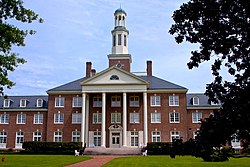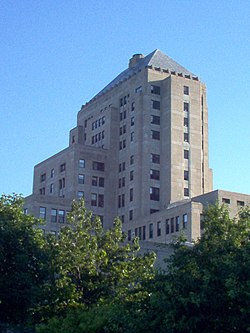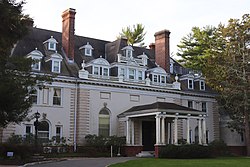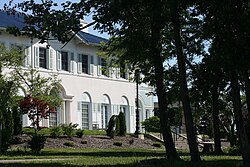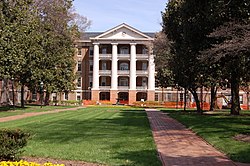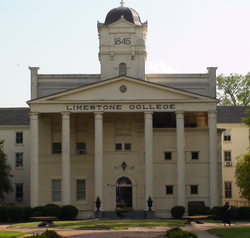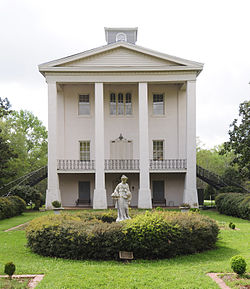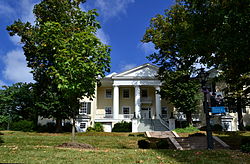| Name | Image | Dates of
women-only | City | Notes |
|---|
| Beaumont College | | ?–1917 | | Closed in 1917 |
| Bethel College | | ?–1951 | Russellville | Co-ed in 1951; closed in 1964. |
| Brescia University | | 1925–1950 | Owensboro | Established a co-ed Owensboro branch in 1925; became fully co-ed in 1950 when the branches merged. |
| Caldwell Female College |  | 1854–1913 | Danville | Originally the Henderson Female Institute in 1854; in 1913, consolidated with the Princeton Collegiate Institute and became the Kentucky College for Women. |
| Campbell–Hagerman College |  | 1903–1912 | Lexington | Founded in 1903; closed in 1912. |
| Cedar Bluff College | | ?–1892 | Woodburn | Closed in 1892 |
| Clinton College | | ?–1876 | Clinton | Co-ed in 1876; closed in 1915. |
| Elizabethtown Female Academy | | 1848–? | Elizabethtown | Incorporated in 1848, [14] grew out of the boys-only Hardin Academy, established in 1806. [15] |
| Georgetown Female College | | ?–1893 | Georgetown | Merged with Georgetown College in 1893. |
| Green River Academy |  | 1834–? | | Founded by the Cumberland Presbytery, now a museum. |
| Hamilton College |  | 1869–1903 | Lexington | Founded in 1869 as Hocker Female College affiliated with the Disciples of Christ. In 1889, Kentucky University (later Transylvania University), bought a stake in the school, taking total control in 1903 and closed in 1932. |
| John Lyle's Female Seminary | | 1806–? | | Founded in 1806. [3] |
| Kentucky College for Young Ladies | | 1874–1896 | Pewee Valley | Opened in 1874, became a co-ed day school in 1896, and destroyed by fire at the end of the century. |
| Kentucky College for Women |  | ?–1926 | Danville | Formerly Caldwell Female College, merged with Centre College in 1926. |
| Lexington Female College | | ?–? | Lexington | [16] |
| Logan College | | 1856–1931 | Russellville | Also known as Russellville Collegiate Institute and Logan Female College. |
| Lynnland Female Institute | | 1867–1870s 1888–1915 | Glendale | Also known as Lynnland Female College, co-ed in the 1870s as the Lynnland Military Institution, then briefly closed. Re-opened in 1888 as the same women's college, and closed in 1915. Currently the site of an orphanage. |
| Midway University |  | 1847–2016 | Midway | Co-ed since 2016 |
| Millersburg Female College | | 1837–1850s 1860–1915 | Georgetown | Founded as Female Collegiate Institute, affiliated with the Disciples of Christ. Through the 1850s it was co-ed. In February 1860, the state granted a charter to the Millersburg Female College, and in June 1867 it graduated its first class of four women. In 1915, it was renamed Millersburg College and in 1931 the nearby Millersburg Military Institute purchased it to be elementary school for its junior cadets. College and a normal department was established in 1862. |
| Nazareth Academy | | 1814–? | Nelson County | Founded by the Catholic Sisters of Charity of Nazareth, moved from its original site outside of Bardstown to Nazareth in 1822. Granted degrees in 1829, later designated as a college. |
| Owensboro Female College | | 1890–1931 | Owensboro | Opened fall 1890, chartered on March 26, 1893. By 1931 the building was taken over by the Owensboro Trade School, and in 1939 the building was demolished in favor of a new building. |
| Pleasant J. Potter College |  | ?–1909 | Bowling Green | Closed in 1909. |
| Sayre Female Institute |  | 1854–1876 | Lexington | Founded as Transylvania Female Seminary, able to confer degrees starting in 1856. [17] |
| Spalding College | | 1920–1973 | Louisville | Founded by the Sisters of Charity of Nazareth as the Louisville campus of Nazareth College, became co-ed in 1973. |
| St. Catharine College |  | 1931–1951 | Springfield | Co-ed in 1951; closed in 2016. |
| Stanford Female College | | ?–1907 | Stanford | Closed in 1907. |
| Ursuline College | | ?–1968 | Louisville | Merged into Bellarmine College in 1968. |
| Villa Madonna College | | 1921–1945 | Covington | Founded by the Benedictine Sisters of Covington, became co-ed in 1945, has an affiliation with the all-male St. Thomas More College (now Thomas More University). |



